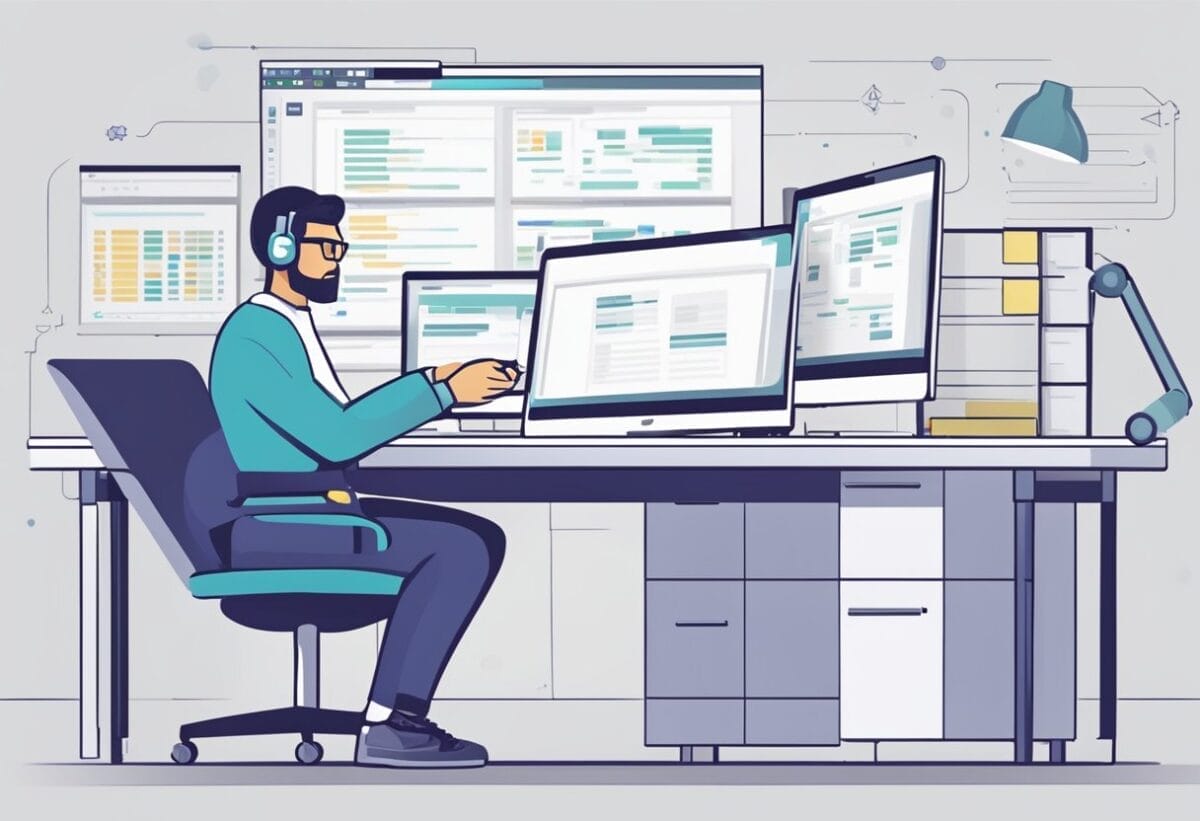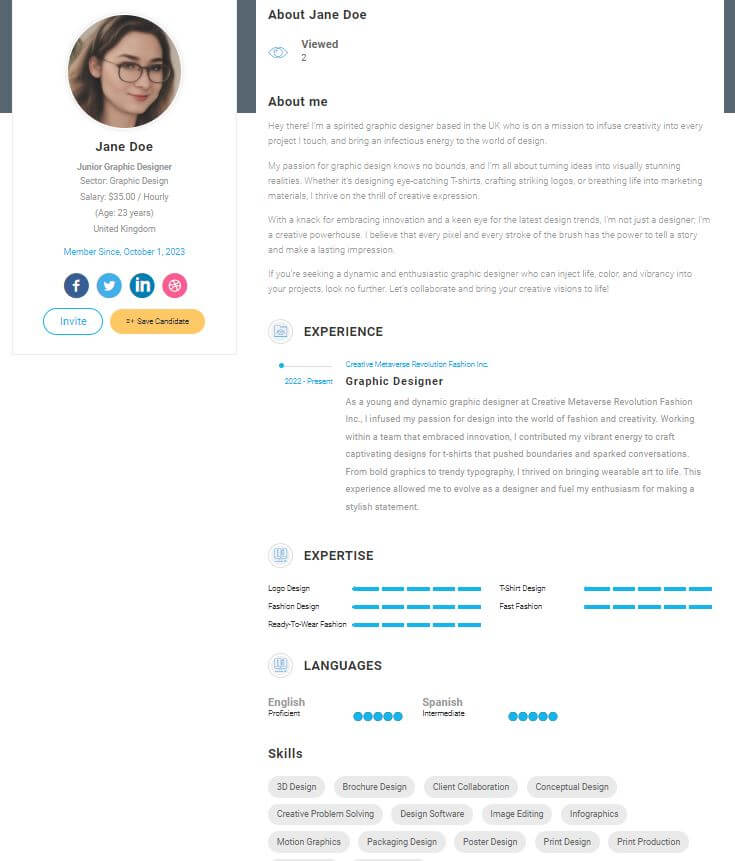A SQL developer is a valued professional in the tech industry. They use their in-depth knowledge of Structured Query Language (SQL) to manage and manipulate relational databases.
These specialists are tasked with a variety of important functions. These range from:
- Developing SQL databases
- Optimizing database performance
- Implementing security measures for data protection.
The demand for proficient SQL developers is consistently high across sectors that rely on robust data management. As an SQL developer you get paid an average of $81,717 per year, this is way above the average hourly pay range of most remote jobs.

Getting a career as a SQL developer begins with a solid foundation in computer science principles. This background complements the specific skills required in SQL development—like understanding complex queries, database design, and the ability to troubleshoot and solve database issues.
Hands-on experience is as crucial as formal knowledge. Whether you’re switching careers or starting fresh, becoming proficient in SQL opens doors to numerous opportunities in the development world.
Key Takeaways
- SQL developers handle database management and optimization.
- Fundamental computer science knowledge supports SQL expertise.
- Practical experience is vital in developing marketable SQL skills.
What is an SQL Developer?
An SQL Developer have a firm grasp on working with Structured Query Language (SQL). Your role involves creating, developing, testing, modifying, managing and maintaining SQL database systems. You have expertise in Microsoft SQL Server, Oracle, and MySQL, which are essential platforms for SQL development.
Your understanding of databases goes beyond mere theories — you know how to implement the best security protocols, design efficient database structures, and optimize data storage and retrieval.
SQL development is not just about writing code. It’s about understanding how to take vast amounts of data and make it useful for your company. You play a crucial role in developing solutions to store and manipulate data, which enable better decision-making within the organization.
What Do SQL developers do?

In the world of database management, SQL developers are crucial. They ensure that data is accurately stored, maintained, and accessible when needed.
Roles and Responsibilities of SQL Developer
Your main role as an SQL developer includes designing and implementing database systems. You’ll create, read, update, and delete data using SQL statements. Here’s what you’ll specifically do:
- Database Design: You’ll plan database architecture and structures, crafting a schema that fits the needs of the application it supports.
- Writing Queries: You’ll write precise SQL queries to retrieve and manage data. Query writing is key for integration with other applications, reporting, and decision making.
- Maintenance: You’re in charge of the database’s health, ensuring high performance and security.
- Data Modeling: You’ll translate complex business logic into a workable database model, establishing clear relationships between data points.
- CRUD Operations: Create/Insert, Read/Select, Update, and Delete data records using SQL commands.
To excel in this field, your job requirements will generally include a strong foundation in relational databases and the ability to write efficient queries. Here’s a comparison of tasks at different levels of SQL development:
| Entry Level | Mid Level | Senior Level |
|---|---|---|
| Write basic SQL queries | Design database structures | Lead architectural decisions |
| Assist in database maintenance | Develop complex stored procedures | Mentor junior developers |
| Learn database management | Performance tuning and optimization | Influence database strategy |
| – | Implement security measures | Drive innovation with new technologies |
| – | Collaborate on data warehousing solutions | Provide high-level technical support |
As you grow in your career, you transition from maintaining existing systems to playing a pivotal part in designing and strategizing advanced database solutions.
Your work ensures that the development and maintenance of the database infrastructure align seamlessly with the organization’s objectives.
SQL Developer Career Pathway
Your journey to becoming an SQL developer starts with mastering the basics of SQL and understanding relational databases. You’ll then progress from simple data manipulation to complex database management tasks. To excel in this career, you should be well-versed in key job requirements such as:
| Early Career | Mid-Career | Advanced Career |
|---|---|---|
| Learning SQL syntax | Designing database schemas | Architecting complex systems |
| Basic data manipulation | Integration with applications | Advanced data security |
| Understanding database design | Advanced query optimization | Leadership and mentorship |
With increasing experience, you’ll move from purely technical roles to ones that require strategic thinking and leadership. It’s a career marked by continuous learning and growing demand in the data-driven business landscape.
Key SQL Developer Skills
As an SQL developer, your technical skills are crucial for building, managing, and optimizing databases. You should be adept in SQL programming, with a solid understanding of various database management systems (DBMS) like Oracle, MySQL, and Microsoft SQL Server.
Data analysis is another core skill. You’ll need to analyze and report data, addressing a range of business problems.
Alongside these are problem-solving and critical thinking abilities, helping you troubleshoot and create effective solutions.
Here’s a comparison of required technical skills for SQL developers:
| Technical Skills | Description |
|---|---|
| SQL Programming | Ability to manage data using SQL commands and create complex queries. |
| DBMS Proficiency | Skilled in systems like Oracle and MySQL for storing and retrieving data. |
| Data Analysis & Reporting | Use data to answer business questions and create reports. |
| Problem-Solving | Navigate complex challenges and find strategic solutions. |
| Query Optimization | Improve database performance through efficient SQL queries. |
Developing soft skills is equally important. Sharpen your communication to discuss technical matters clearly.
Collaborate effectively with other developers, database administrators, and business analysts. Accuracy in your code will save time and optimize efficiency.
Your analytical skills should complement your ability to work with data science concepts and tools. This includes business intelligence and statistics, as they are often part of the job.
Lastly, you’ll interact with various database objects, learning how to handle stored procedures and triggers to automate and streamline tasks.
Keep abreast of emerging technologies like NoSQL databases and cloud platforms such as AWS, to stay ahead in the field.
How to Become an SQL Developer (Step Guide)
Becoming a SQL developer involves a series of strategic steps, each building towards proficiency in handling databases. Here’s a step-by-step guide to steer you in the right direction:
Step 1: Obtain a Formal Education
Start by getting a foundational education. Aim for a bachelor’s degree in computer science, information technology, or a related field. Your degree imparts essential technical knowledge that will be crucial throughout your career.
| Education Level | Advantages |
|---|---|
| Bachelor’s Degree | Comprehensive knowledge, industry standard |
| Online Courses & Bootcamps | Flexibility, specialization |
Step 2: Gain Certifications
Enhance your technical prowess through certifications. A Microsoft Certified Professional Developer or an Oracle PL/SQL Developer Certified Associate credential can significantly boost your employability.
- Microsoft Certified Systems Engineer: Validates your ability to design and implement complex SQL databases.
- Oracle PL/SQL Developer Certified Associate: Demonstrates your expertise in Oracle’s database language.
Step 3: Practical Experience
Apply your skills in the real world. Start with simple projects or an internship to muster hands-on experience.
- Internships: Gain exposure, mentorship, and work on actual projects.
- Personal Projects: Showcase your initiative and practical knowledge.
Step 4: Continuous Learning
Stay updated with the latest industry trends. Enroll in online courses and attend workshops.
These will keep your skills sharp and help you network with professionals.
Get your 100% Free online resume and get noticed by potential employers. Start out of the crowded space of millions of remote job seekers and find the remote job that you will enjoy and love.

- 5 Minutes Online Meeting Games to Foster Teamwork and Engagement Remotely
- 11 Benefits for Getting a Remote Job: Unlocking Flexibility and Freedom
- How to Get Remote Writing Jobs For Beginner (Freelance Writing)
- How to Get a Remote Part-Time Job (Flexibility + Stability)
- How to Get a Second Remote Jobs and Earn a 6-Figure Salary?
Join over 11,000+ achievers who are committed to achieving their career goals!




![How to Write Resignation Letter by Email [Examples + Template] 7 How to write resignation letter by email. Examples and Template](https://hqhire.com/wp-content/uploads/2020/10/How-to-write-resignation-letter-by-email.-Examples-and-Template-768x402.png)

